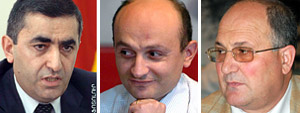The Resolution on the “Situation in the Occupied Territories of Azerbaijan” put to vote in the General Assembly of the United Nations on March 14 and adopted by a vote of 39 in favor, 7 against and 100 abstention, is currently estimated by both neighboring countries as the defeat of the opposite side. “The key points of the balanced proposals were introduced in Madrid by the OSCE Co-Chairs on November 29, 2007. These proposals are based on the equality of the principles of the states’ territorial integrity and the nations’ rights to self-determination. The political assessment of the fact of Azerbaijan’s committing genocidal acts in response to the steps undertaken by the NKR people based upon the USSR laws and the idea of the impermissibility of new ethnic cleansings and the military solution of the conflict after establishing the ceasefire regime. Applying an international sanction against any party to the conflict and resorting to military solutions in case the given party refuses the mediation of the Minsk Group. This may also include submitting the issue to the discussion of the Security Council,” reads the resolution. Right after the adoption of this resolution the FMs of Armenia and Azerbaijan reacted on that. If in the opinion of the Azerbaijani FM Araz Azimov “this is a very important document, which has both legal and political power” then in the opinion of the Armenian FM Vardan Oskanyan “this document may become an alert for Azerbaijan because the majority of the UN member states were against the document.” Nevertheless, what is this document all about and what consequences it may have for our country and the NKR? “The goal of the Azerbaijani side is to ratify the NKR conflict legally through international documents as they understand that they cannot re-occupy Karabakh again. Later they may use the political goal to reach their goal,” said NA MP of the Heritage Faction Stepan Safaryan. “This document is far from reality and doesn’t conform to the essence of the conflict and the regulation process. Azerbaijan is once again trying to move the conflict resolution from the framework of the OSCE Minsk Group to other international instances. I am sure that this resolution will not have any serious consequences. All it can have is an advocacy consequence,” said a member of the ARF faction, chairman of the NA Foreign Relations Committee, Armen Rustamyan. “Azerbaijan is trying to move the NKR regulation from the framework of the OSCE Minsk Group to the Council of Europe, unspecialized structure, to the UN by hoping that it may have better impact for their policy. The co-chairmen of the Minsk Group were really delved in the process and drew a conclusion, which Azerbaijan doesn’t like. That is the reason why Azerbaijan was constantly trying to move the regulation process to another instance and the country succeeded in it. No matter how we claim that the document is not legally binding nevertheless it wasn’t a favorable thing for us. If there are documents approved by international structures they will be constantly used and other instances will also rely and refer to those. It may have a moral impact and become a reason for other type of discussions. The Azerbaijani side has been constantly accenting on that document,” said a Republican MP of the NA Samvel Nikoyan. The recently adopted document had been proposed by Azerbaijan to the General Assembly of the UN since 2004. Our interviewees also agreed that Azerbaijan has been constantly trying to move the draft to the UN instance. Why did Azerbaijan succeed in it in such a surprising way for Armenia? Here almost all our interviewees were unanimous. “The main reason was that Azerbaijan realized that the discussion of the conflict resolution in the framework of the OSCE was not favorable for the country. All the instances, which had somehow dealt with the NKR conflict, cannot ever resolve the conflict on behalf of Azerbaijan. Therefore, they should seek for a solution in such instances, which are not well-aware of the conflict and will vote for political reasons,” said Rustamyan. “I think that during the voting the recent events had also had their impact. During one day Armenia got so weakened. If we didn’t have such a negative post-electoral period the reaction of the UN General Assembly would have been different. If we are weakened our country ourselves why wouldn’t the foreign states benefit from it? We may say opposition or government inside out country but for the outside world we are Armenia,” said Nikoyan. “I am sorry that the March 1 events also affected the adoption of this resolution. The government, which was responsible for those incidents, essentially deteriorated the position of Armenia in the world. In 2004 when this resolution entered the UN for the first, Armenia was having a hard period as well. At that time there was also collision of the opposition vs. government. I mean the events of April 13, during which the government wasn’t wise again. During such events the international structures show various kind of pressure. It’s quite clear that Azerbaijan is benefiting from that,” says Safaryan. Let us inform that despite the fact that the three countries of the Minsk Group were against this resolution nevertheless 100 member states of the UN abstained during the voting and 50 others didn’t vote at all. The government and opposition have different interpretation about this issue. “Perhaps I consider it silent disagreement. The powerful US, France and Russia voted against and it is very important for us,” said Nikoyan. “I find it neutral agreement to the adoption of the resolution because if America, France and Russia agreed they wouldn’t be so neutral,” said Safaryan.

